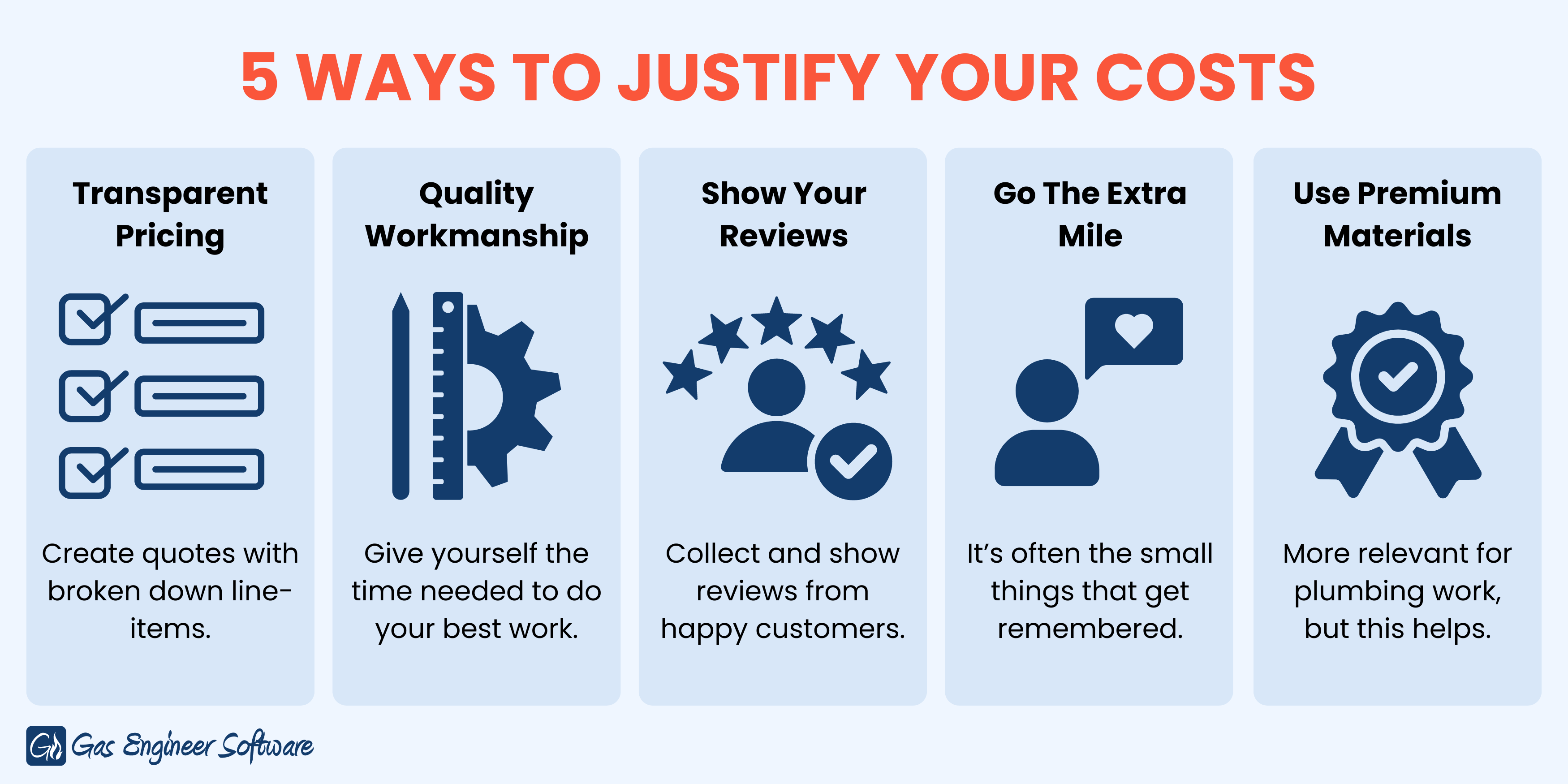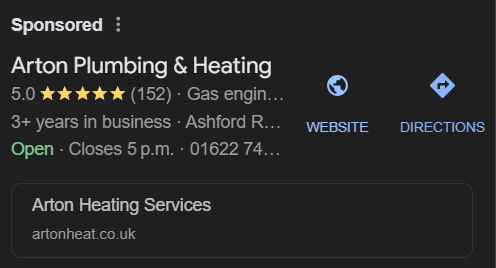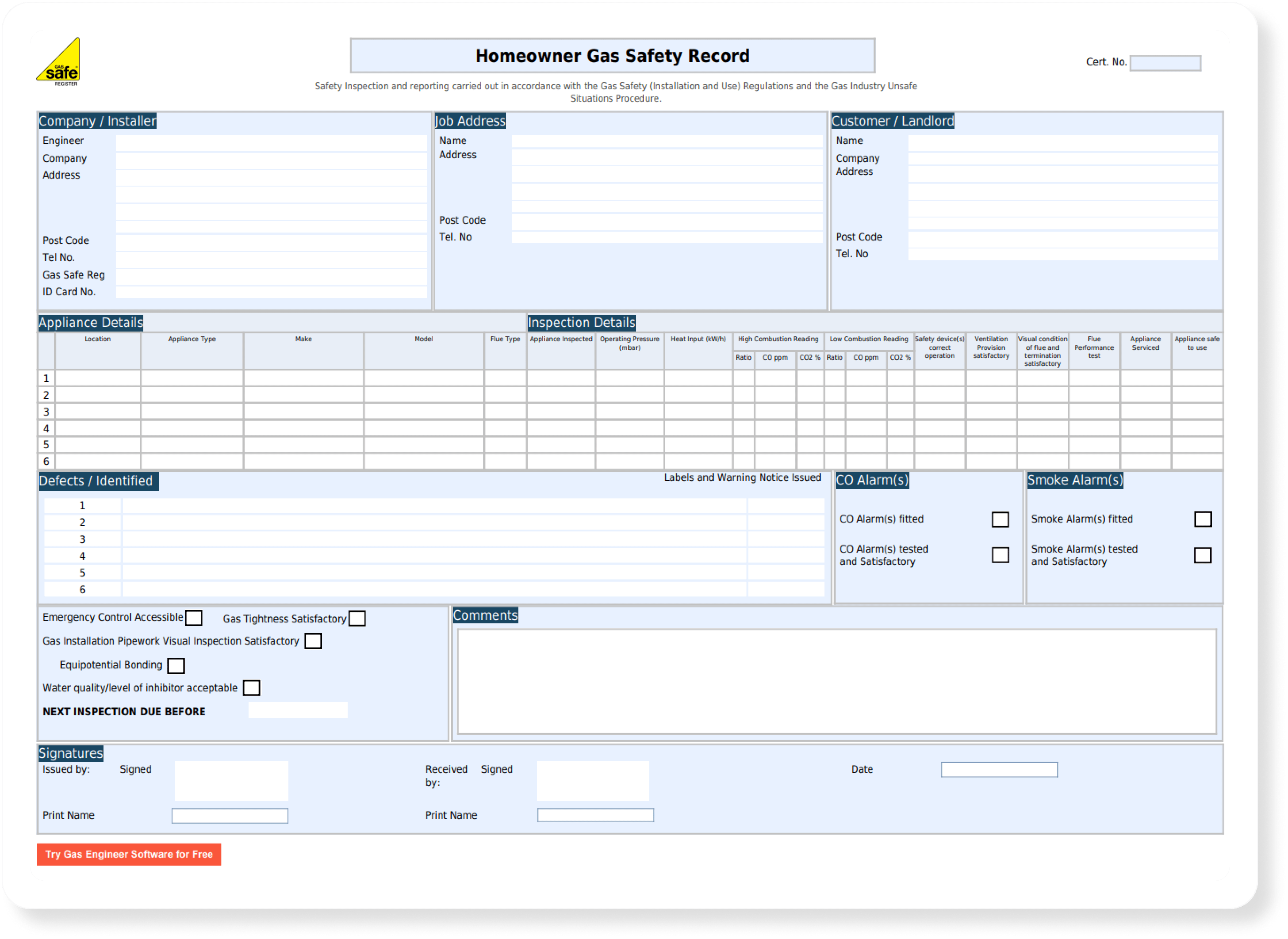How To Justify Your Heating & Plumbing Business Prices [5 Tips]
![[Featured Image] Justifying costs (1)](https://gasengineersoftware.co.uk/wp-content/uploads/2023/10/Featured-Image-Justifying-costs-1.png)
Pricing is perhaps the most important thing to get right for your trades business – and it’s no different in the heating industry.
We’ve talked in detail about avoiding low prices (as well as data on average prices across the UK) and written up a helpful guide on pricing strategy, but knowing what to charge is only half the problem. A string of quotes lost to cheaper competitors or customers saying you’re expensive can make you think twice about your pricing, but charging more means bigger profit margins and a less stressful business. All you’ve got to convince your customer you’re worth it.
In this article, we’ve put together 5 useful tips for you to justify your prices together as well as a bunch of advice gathered from a recent conversation with Luke Stanyer from Blue Bulldog Plumbing & Heating.
How to justify your costs
In an ideal world, you shouldn’t have to justify your costs.
Nowadays, however, customers are doing far more research than ever and comparing several options. You’ve got to show them why they’ll be better off with your service, even if it’s slightly more expensive than some of your competitors.
Fortunately, there are several good ways to explain why your work outshines your competitor’s (and the cheapest option on the block).

1. Be transparent with your pricing
If you lump together parts of the job under a single line item in your quotes, think about separating them out so the customer can clearly understand what they’re paying for. Breaking things down makes them feel more approachable and not such a mystery number.
Check out Gas Engineer Software’s quick and easy quotes with templates and line items.
2. Highlight and showcase your quality of work
This can be done through marketing, case studies, or simply as you speak to customers over the phone. The goal is to give customers a clear picture of what they’re paying for, and what they can expect (which is incredibly important for customers who are careful with money).
One good way of doing this is getting into the habit of posting photos of your finished jobs on social media.
3. Show (and ask) for reviews
Reviews are a great way to display that your previous customers are happy with the value of your work. Just remember to ask every customer for a review so you can build up a good collection. For a user browsing gas engineers near them online, having reviews like this does wonders:

4. Prioritise customer relationships
Customers like to feel valued and appreciated, and those that do will be far more likely to spend a little more. This is often a bunch of small things that add up over time. Replying to calls and messages quickly, getting your quotes out on the same day, being friendly – and just generally going the extra mile.
Read the full blog: How to show your customers you care.
5. Use premium materials
This might be less relevant for the boilers themselves, but all the piping and any plumbing work you should have materials to match your craftsmanship.
At the end of the day, your work will justify its own cost. Once you get your foot in the door with a first job, your quality craftsmanship, hassle-free customer service, and anything else will help encourage repeat business.
Why it’s important to know your worth
For the most part, prices reflect quality – but it’s not always that simple. It can feel like a race to the bottom when it comes to pricing, and many heating businesses price lower than they’d like out of the fear of not getting enough work.
But it’s a double edged sword, as lower prices and more work mean you have less time – and quality often suffers as a result.
In our conversation with Luke, a few questions came to mind:
Do you communicate the value of your experience & craftsmanship?
A heating business with the time, skill, and experience necessary to do a proper good job will have happier customers – regardless of whether they charged a little higher than average.
But one of the difficulties is being able to convey the value of this experience & craftsmanship.
Speaking to Luke, he revealed that he was faced with this very problem: “I can walk into a job and know what’s wrong and have it fixed really quick”, he said – but the customer then questioned why his prices were so high if the job only took 15 minutes. Luke put it best when he said “It took me 15 years to do it in 5 minutes”. It’s his experience and result he’s charging for, not how long he was there for.
They could have easily found a cheaper company, but they would have taken much longer and ended up charging a similar rate anyway. “I shouldn’t be penalised for that” he added.
Do you feel underpaid when you do your best work?
It’s impossible to feel 100% motivated for jobs you believe you’re being underpaid for, and this shows in all of your work. Being paid fairly will give you much more of an incentive to do your best for every customer.
“In this trade, you can’t just walk away from a job. If they’ve got no water, you’ve gotta stay until they’ve got water. Or if you’ve taken out the toilet….” he explains. To him, it’s important to always give a job his best: “I’ll always give 110%”.
How do you stack up against the competition?
There is shoddy craftmanship in every trade, and people looking for a quick buck. You’ve almost certainly walked in on a property that’s had work like this done before you, and it can create a nightmare for both you and the customer.
Anyone that does higher quality work should feel justified in charging more.
“The worst is walking in after someone who’s generally a cowboy”, noted Luke. Describing one experience in particular, he says “nothing was level, the toilet and the basin were a mess, and we had to rip it all out and start again”.
“My problem is I’m not cheap compared to some people”, says Luke. “There are people around me that are cheaper, but when I walk in afterwards and see the work…it’s all wonky, or they’ve put so many joints in, not bothered to get the benders out… it’s just little things like that. And you think if they’d done a little bit extra, it would have looked better and worked better”, he elaborated.
Perfect your customer service with Gas Engineer Software
Use Gas Engineer Software to streamline workflows, eliminate paperwork, and give yourself the time you need to do your best work.
From our paperless gas certificates to our quotes, invoices, schedules, and reminders – our job management system is purpose-built for heating & plumbing businesses. Click below to jump in to a free 14-day trial.
Next steps:
If you’ve been thinking about implementing software into your workflow to save time, here’s what you can do next:
- Visit our resources centre where you'll find more articles like this one and our free gas rate calculator.
- Start a free trial to see exactly how our software works for your business.
- Watch our video demo to get an idea of how our software works. You can also book a 1-on-1 session with our customer success team for a more personalised experience.
- Know an engineer who's still using paper? Help them and us out by sending our software their way!


















